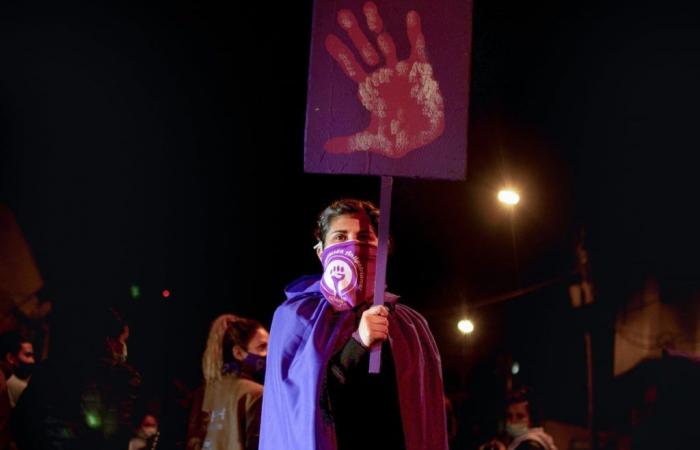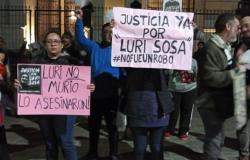Sitting in the office of a family police station in northwest Bogotá, a 24-year-old woman trembles from head to toe as she talks about the man who almost killed her less than a week ago. Her mother holds one of her legs and cries with her face covered by a mask. The last of her seven children, Laura Beltrán *, hopes to receive protection from the authorities and report her boyfriend who has violated her since she was 13 years old. The same one that last weekend, Laura maintains, caused a fire in the apartment that she shared with the young woman, with the firm intention of ending her life.
Although she managed to escape unharmed and avoid a catastrophe in the residential building, Beltrán had to flee with only what she was wearing, after her attacker destroyed many of the belongings she had worked for since she was a child. “She managed to burn the television and a lot of the clothes,” says the young woman with a childish face, while she clenches her knuckles.
“I don’t want to see my daughter dead,” continues her mother, Ruth Castro*, with labored breathing. The moans of both fill the office, dark and loaded with folders. A soulless place where Castro prays with her head turned towards the ceiling, hoping that this office will save the daughter that she no longer knows how to protect. Beltrán has become the object of obsession for a 30-year-old man who, according to her, has made her promises of love and change, but who has also told her that he would rather die than leave her free. “He tells me that it is better that they bury us both, before I leave him,” she comments to the woman. Her story could well be compared to the story of the 665 women registered by Forensic Medicine in Bogotá who have potential feminicides breathing down their necks.
For people outside the hustle and bustle of the premises, the family scene might seem unusual, but within those walls Beltrán’s narration does not arouse surprise. Every day, among the almost 600 people who go to the 22 police stations in Bogotá, an average of 140 report “domestic violence” (sexist violence). Of those, more than 77% are presented by women. The outbreak of attacks in the capital translates into femicides. Just two weeks ago, Bogotá saw three women die in less than 36 hours. Their names were Natalia Vásquez, Stefanny Barranco and Celeste Morales. The latter was a girl of just three years old who was raped and murdered by her stepfather, and whose death would fall into the category of child femicide.
Castro prays that his daughter does not join those statistics. About eight kilometers from the office where they file the complaint, at the family police station in the town of Fontibón, three young people hear stories similar to Beltrán’s every day. Two are social workers; the remaining one is a psychologist. They are the telephone operators of the purple line or ‘A call for life’, a mechanism of the District Secretariat of Social Integration to assist victims of sexist violence. Most of the calls received by 601-3808400 come from the city’s hospitals, from where they report attacks on women seeking health care for cuts, burns or gunshot wounds. The injuries, in many cases, are inflicted in the presence of their children or other minor relatives.
These stories were very difficult to hear for Lizeth Cristancho, 25, Fernanda Castañeda, also 25, and Erika Hernández, 27, but they have now become everyday stories. A cut on the legs made with scissors, a gunshot wound on the thighs, a knife cut in the abdomen, or all possible threats and insults are frequent notes they make of the calls they receive. With less than 30 years of age, they have heard firsthand the most infamous limits of family cruelty. “Sometimes one gets very burdened by the complaints, but it is increasingly difficult to be surprised,” says Cristancho, mother of a baby who is barely 11 months old.
Newsletter
The analysis of current events and the best stories from Colombia, every week in your mailbox
RECEIVE THE
Only the three of them answer the only telephone channel to which calls reporting sexist violence arrive, and they are the ones who direct the complainants to the more than 30 family police stations in Bogotá, usually those in the most impoverished areas of the city such as Ciudad Bolívar, Bosa, Kennedy and Usme.
The one they manage is the only line from which protection measures can be established for victims of attacks. ‘A call to life’ activates care routes so that victims receive the required care, and many times they need help ranging from security to financial, including emotional support. In the case of Beltrán, his family has a delicate socioeconomic situation that has prevented Castro from helping his daughter in many of the moments in which he has needed her. “Sometimes I get desperate because I don’t even have a bus that I can use to go check on him,” she says, avoiding her gaze.
The operators of ‘A Call of Life’ try to lighten these stories with jokes and anecdotes in the moments when the phone stops ringing. “If we don’t talk to each other, we burden each other a lot,” says Hernández. The three are usually a first filter in the process of reporting violence or monitoring non-compliance with protection measures, and they are aware that victims depend on many other institutions to be protected. “We have to coordinate with entities such as the Women’s Secretariat, the Police, the Prosecutor’s Office and the Colombian Institute of Family Welfare to guarantee the processes,” explains Alejandra Jiménez, commissioner in charge of the operation of the line and head of the three operators. . If the chain of cooperation between authorities is broken, cases may remain in limbo. “Sometimes it is difficult to reach the point of capturing the aggressors or applying criminal sanctions,” explains Jiménez, who for three decades has been dealing with cases of sexist violence from the Ombudsman’s Office and the Secretariat of Social Integration.
Errors in monitoring cases and working together complicate situations like Beltrán’s. Shortly after he came of age, his mother tried to file a criminal complaint for her son-in-law’s attacks on her daughter, but the report never had any effect and left Castro without solutions. He only had four sheets of paper left to prove his intentions to help his daughter. “At the Prosecutor’s Office and Legal Medicine they told me that I couldn’t do anything because my daughter was of legal age. Furthermore, the police have told me several times that they don’t get involved in couple troubles,” says the mother, her face streaked with despair.
Rocío Puerta, one of the commissioners in charge of the office where Beltrán files his complaint, believes that the bases of sexist violence in Bogotá are not sufficiently addressed, and that is why it continues to rise. “We need to work on the reparation of victims and families, on the mental health care of victims and perpetrators so that relationships can be transformed,” says the family law expert. She notes that the wounds of war have also left scars on families in Colombia.
Commissioners like her and Jiménez, who have worked their entire lives protecting families, are convinced that changes and reinforcement in education are required to turn around the situation of violence in the capital. “We must insist on the emotional training of the youngest. “We are very surprised to see that many of the victims and perpetrators are between the ages of 18 and 25,” says Jiménez.
For now, faced with the social commotion due to femicides in the city, the local administration and the Secretariat are proposing measures to expand the offer of services to families. Strategies such as expanding the staff of telephone line operators or having prosecutors delegated to police stations. Concrete plans are still under discussion. “We are not planning to strengthen the services and their scope between the next six months and a year,” says Natalia Velasco, deputy director of the Bogotá police stations. “We want to get to the point where there are no more victims. “That is our ultimate goal,” the official continues.
That is the hope that Beltrán shares, applied in his own life. He doesn’t want to be a victim anymore. “I want to heal myself. Work on myself to get out of this situation, and get justice for the things he has done to me,” he explains between sobs. Her mother holds the complaint she made in 2017 in her lap. They both hope that this is the moment to free themselves from the history of abuse and agree that their calmest time in the last decade were the two years in which their ex-boyfriend Beltrán was in jail.
“Everything was fine until April when he came out,” says the exhausted mother. The perpetrator was never detained for having stepped on the face of her girlfriend, for having wounded her with a knife, or for having locked her in the house they shared. He does not have a record of gender violence. He went to jail for stealing a power cable on an anonymous street in Bogotá.
Subscribe here to the EL PAÍS newsletter about Colombia and here to the channel on WhatsAppand receive all the information keys on current events in the country.






